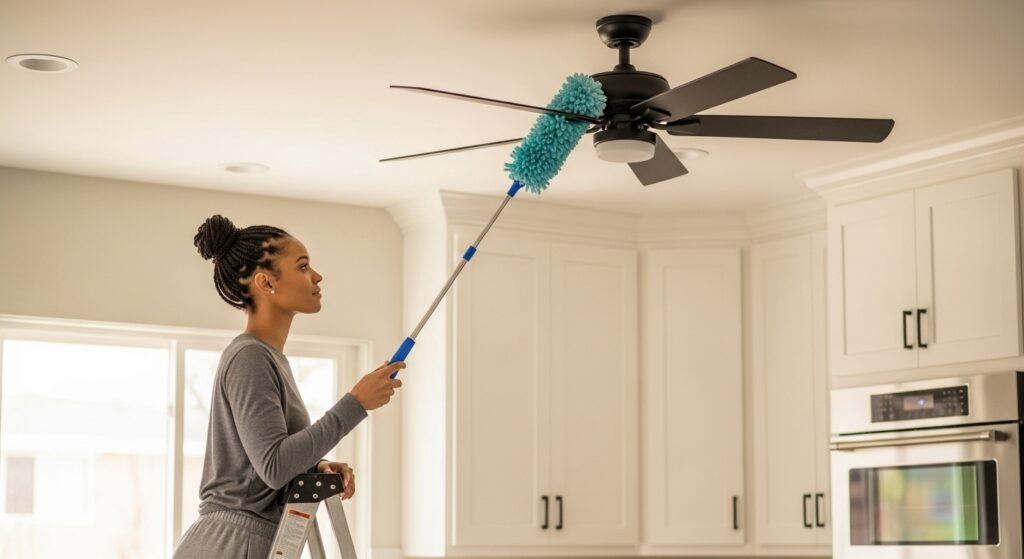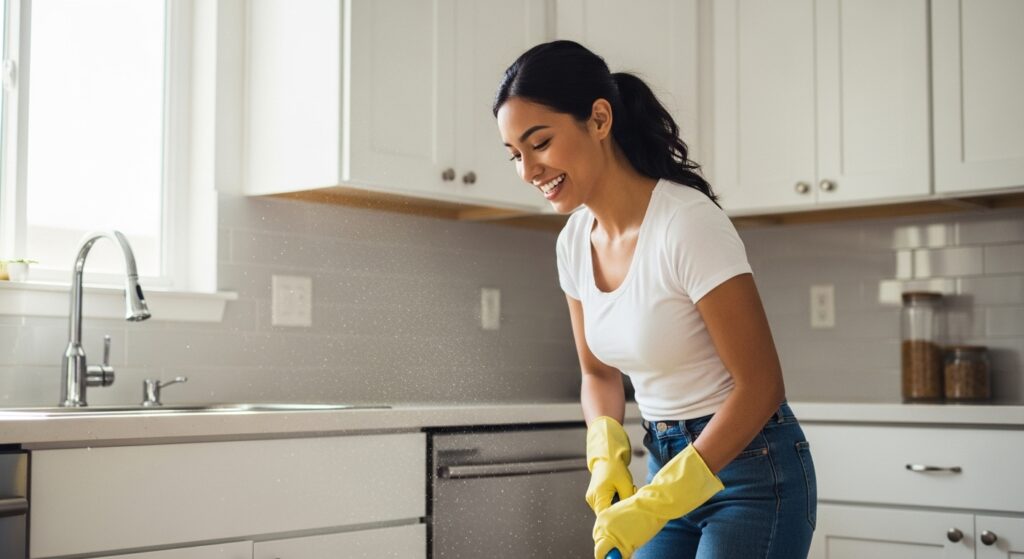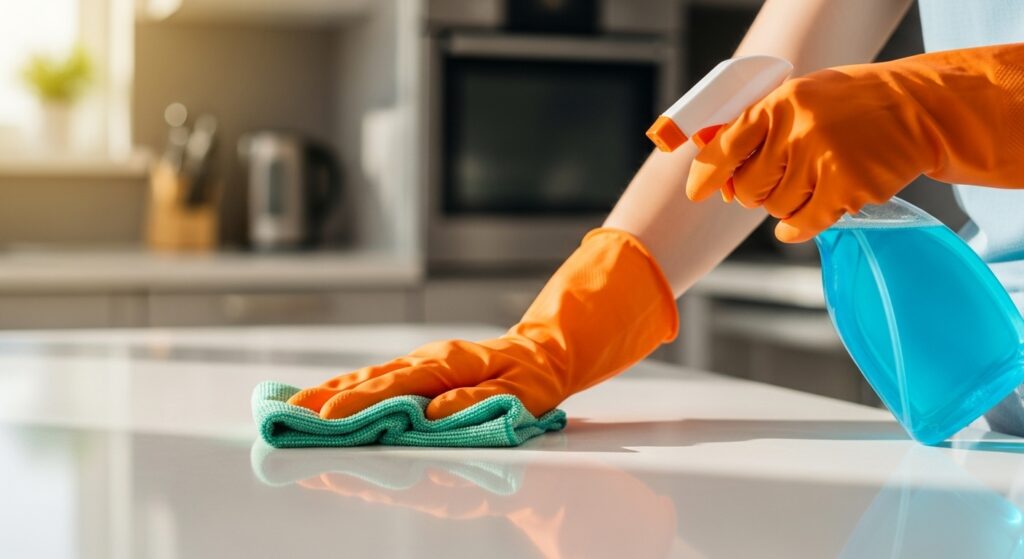Start With the Right Mindset
Maintaining a clean and organized home every day can feel overwhelming, but it’s much easier when you break it down into simple habits. The key to effective daily house cleaning is to keep your routine manageable and consistent, so that messes never pile up. By dedicating just a small amount of time each day, you can avoid spending long hours on weekends catching up. This approach helps reduce stress and keeps your home feeling fresh and welcoming.
Think of daily cleaning as a way to maintain the order you already have, rather than trying to fix chaos all at once. When you develop a rhythm of tidying, wiping, and quick touch-ups, your home will naturally stay in shape. Setting realistic expectations and focusing on small, meaningful tasks can truly transform your cleaning experience into something enjoyable and less tiring.
Getting Started With Your Cleaning Schedule
Starting your daily house cleaning routine begins with being fully prepared. First, get ready by gathering all your essential cleaning tools and supplies in one convenient spot. Having everything from sprays, cloths, and brooms organized and accessible makes it much easier to clean quickly and efficiently. You won’t waste time searching for items, and it helps keep your momentum going.
Next, choose your rooms wisely by focusing on the high-traffic areas—places like the kitchen, living room, and bathrooms tend to get messier faster and need daily attention. Prioritizing these spots will have the biggest impact on the overall cleanliness of your home. Finally, identify daily cleaning tasks such as wiping down counters, sweeping floors, or tidying clutter. By breaking your cleaning into small, focused actions, you create a routine that’s easy to follow and maintain every day.

Identifying Daily Cleaning Tasks: What Needs Attention Every Day
To keep your home consistently fresh, break down your daily house cleaning tasks by area and focus on small, manageable actions. In the kitchen, make it a habit to wipe counters and the stovetop regularly to prevent buildup of grease and crumbs. Sweep or mop the floors daily, especially near the cooking and dining areas, and clean sinks and faucets to keep them sparkling and hygienic.
For the living and bedroom areas, start by tidying clutter and organizing essential items so spaces feel calm and inviting. Making beds each morning and folding laundry regularly helps maintain order. Don’t forget to dust surfaces like tables, shelves, and electronics, and vacuum high-use areas such as rugs or upholstery to keep dust and allergens at bay.
In the bathroom, focus on wiping down sinks, counters, and toilets every day to prevent grime and germs. Keep mirrors and shower walls clean and streak-free, and swap out towels and mats frequently to keep things fresh and welcoming.
Lastly, in your miscellaneous daily tasks, make sure to empty trash and recycling bins so odors don’t build up. Spot clean electronics and other frequently touched surfaces to reduce germs, and quickly tidy entryways and mudrooms to keep the first impression of your home neat and organized. These simple yet effective tasks create the foundation for a clean and comfortable home every day.

Building Your Cleaning Routine: Frequency and Style
Once you know what tasks need daily attention, it’s time to decide how often and when you’ll clean each area. Some parts of your home, like the kitchen and bathroom, may need daily care, while others like bedrooms and living spaces might benefit from lighter tidying every day with deeper cleaning weekly or monthly. Selecting the right cleaning frequency for each space helps you maintain a balanced routine without feeling overwhelmed.
Next, consider your personal cleaning style. Do you prefer to clean everything in one go for a deep refresh, or would you rather split tasks across days to keep things manageable? For busy schedules, short timed sessions—like 15 to 20 minutes per day—can make a big difference. Alternatively, dedicating specific days to certain rooms or tasks creates structure and ensures nothing is overlooked. Tailoring your schedule to your lifestyle is key for staying consistent and stress-free.

Practicing and Sticking to Your Cleaning Schedule
Starting your new cleaning schedule can feel tricky at first, but practice makes it easier. Think of your first month as a trial run—focus on building momentum rather than perfection. Set realistic goals for each session and don’t be discouraged if you don’t finish everything right away. The goal is to create a habit that fits naturally into your daily life.
To stay on track, use reminders like a checklist or calendar alerts to keep cleaning top of mind. If you miss a day or fall behind, don’t stress—simply pick up where you left off. Over time, this routine will become second nature, and you’ll find it easier to maintain a consistently clean home with less effort.
Reevaluating and Adjusting Your Cleaning Routine
After practicing your cleaning schedule for a month, take time to reevaluate how it’s working for you. Ask yourself which tasks felt manageable and which felt overwhelming. Maybe some rooms need more attention, or certain chores can be spaced out more. Adjust your routine to fit your lifestyle better and keep it flexible.
Remember, a cleaning schedule isn’t set in stone—it should evolve as your needs change. If a particular approach isn’t working, don’t hesitate to try a new method or rearrange your tasks. The key is to find a sustainable routine that keeps your home tidy without causing stress or burnout.
Cleaning Methods and Styles
Make It a Habit — Staying Consistent Without Stress
Turning your cleaning routine into a habit is key to keeping your home consistently tidy without feeling overwhelmed. Start small by committing to your daily cleaning tips, even if it’s just one simple task a day. Over time, these little actions build momentum and become part of your everyday life. Don’t stress if you miss a day — just pick up where you left off without guilt. The goal is progress, not perfection.
Use reminders like phone alerts, checklists, or a cleaning planner to stay on track. Celebrate small wins to stay motivated. When cleaning feels like a natural part of your routine, it’s easier to maintain a clean, organized home with less effort.
Let Your Cleaning Products Do the Work — Tips for Efficiency
Efficiency is your best friend when cleaning daily. Use cleaning products that work well with minimal scrubbing. For example, spray surfaces first and let the cleaner sit while you tackle other tasks like tidying up or wiping down electronics. This “work while you wait” method cuts down cleaning time without sacrificing results.
Invest in quality tools like microfiber cloths, spray mops, and lightweight vacuums to speed up your routine. These tools pick up dust and dirt better and often require fewer passes. Finding products you enjoy using also helps make cleaning less of a chore.
Tips for Saving Time on Daily Cleaning
Multitasking Smartly — Cleaning While Cooking or Tidying Up
One of the smartest ways to save time is to multitask during your daily chores. For example, while cooking, wipe down counters and sweep the floor nearby to prevent buildup later. Using moments like waiting for water to boil or food to simmer is perfect for quick cleanups. This keeps your kitchen tidy without extra time dedicated solely to cleaning.
Similarly, tidy up clutter as you go throughout the day. Putting away items immediately or handling small messes right away can prevent them from piling up, making your daily routine much easier and less overwhelming.
Involve Your Household — Divide Tasks for Faster Completion
Cleaning doesn’t have to be a solo effort. Get your family or roommates involved by dividing tasks based on preferences or abilities. Assign simple daily chores like taking out trash, dusting, or tidying common areas to each person. When everyone pitches in, cleaning becomes quicker, and the house stays neat more consistently.
Sharing responsibility also creates a sense of teamwork and helps build good habits for everyone. Plus, it reduces the pressure on you, making daily cleaning more manageable and less stressful.
Use Time-Saving Tools — Vacuums, Microfiber Cloths, and Spray Mops
Investing in time-saving tools can make a huge difference. Lightweight vacuums, microfiber cloths, and spray mops can clean surfaces more effectively and quickly than traditional methods. Microfiber cloths pick up dust and dirt without spreading it around, and spray mops let you clean floors with less effort and no heavy buckets.
Automated tools like robotic vacuums can handle daily floor cleaning with minimal effort from you, freeing up time for other tasks or relaxation. Choosing the right tools helps you maintain a clean home without exhausting yourself.

Beyond Daily Cleaning
Weekly Cleaning Tasks — Deep Cleaning Key Areas
While daily cleaning keeps your home neat, weekly cleaning tasks dive deeper into areas that need more attention. This includes washing bedding, vacuuming carpets thoroughly, scrubbing bathroom tiles, and cleaning kitchen appliances like ovens and refrigerators. Tackling these tasks weekly prevents dirt buildup and keeps your home feeling fresh and healthy.
Creating a weekly routine helps balance the daily tidying with more thorough cleaning without feeling overwhelmed. It also ensures all parts of your home get the care they need on a regular basis.
Rotating Tasks — Seasonal and Monthly Focus
Some cleaning jobs don’t need to be done weekly but still require regular attention. These rotating tasks can include things like cleaning windows, dusting ceiling fans, organizing closets, or deep-cleaning upholstery. Tackling these on a monthly or seasonal schedule keeps your home in great shape year-round.
Rotating your focus lets you spread out bigger jobs and avoid burnout. Scheduling these tasks ahead of time can help you stay organized and ensure nothing important gets missed.
Making Cleaning a Habit — Staying On Track Without Stress
The key to success with any cleaning routine is to make it a habit. Consistency, rather than perfection, keeps your home clean and your stress low. Use reminders, checklists, or calendars to help keep you on track, and remember it’s okay to adjust your routine as needed.
Don’t beat yourself up over missed days—what matters is getting back on schedule without guilt. A flexible mindset allows cleaning to fit into your life, not take it over, making it a sustainable and even satisfying part of your daily routine.

Adapting the Routine to Your Life
Working Outside the Home — Efficient Cleaning with Limited Time
If you work outside the home and have limited time, focusing on short, targeted cleaning sessions can make a big difference. Use your available pockets of time—like mornings before work or evenings—to tackle essential daily tasks. Even 5 to 10 minutes of focused cleaning can keep your home manageable.
Prioritize tasks that make the most impact, like clearing clutter, wiping down surfaces, and quick vacuuming. Planning ahead and sticking to a simple routine helps keep things under control despite a busy schedule.
Irregular Work Hours and Busy Schedules — Flexibility in Cleaning
For those with irregular work hours or unpredictable days, flexibility is key. Don’t stress about completing every task daily; instead, adjust your cleaning based on your available time and energy. Doubling up on tasks during days off or using catch-up days can help maintain progress without burnout.
Allow yourself grace if a day or week gets hectic. The goal is consistent effort, not perfection. Building cleaning into your life with a flexible plan makes it easier to stay on top of chores over the long run.
Managing Cleaning with Young Kids or Limited Mobility
Cleaning when you have young kids or limited mobility can be challenging but not impossible. Break cleaning tasks into smaller, more manageable chunks and spread them out throughout the day or week. Involve kids in simple chores to teach responsibility while lightening your load.
Use tools and cleaning methods that reduce strain, such as lightweight vacuums, spray mops, or microfiber cloths. Don’t hesitate to ask for help from family or hire assistance if needed. Remember, small consistent efforts go a long way in keeping your home clean and safe.
Troubleshooting and FAQs
Daily cleaning can sometimes feel overwhelming, especially when life throws unexpected challenges your way. Here are some common issues and practical solutions to keep you on track without stress.
How to Handle Missed Days or Overwhelming Messes
Missing a cleaning day or facing a big mess is normal. Don’t get discouraged — simply pick up where you left off. Use catch-up days or break the cleaning into smaller sessions. Focus on priority areas like the kitchen and bathrooms first, then tackle less urgent spots later.
Common Challenges with Daily Cleaning
Balancing cleaning with a busy schedule, managing clutter buildup, and maintaining motivation are typical challenges. Setting realistic goals, using timers, and involving your household can make daily cleaning more manageable and even enjoyable.
What Not to Clean With Vinegar and Other Product Tips
While vinegar is a powerful and natural cleaner, avoid using it on surfaces like marble, granite, or hardwood floors as it can damage them. Always check product labels and test cleaners on small areas first. Using the right cleaning products protects your surfaces and saves time by reducing the need for re-cleaning.
Resources and Support
Having the right tools and support can make daily house cleaning easier and more effective. Here are some resources to help you maintain a clean home with less hassle.
Printable Cleaning Schedules and Checklists
Using printable schedules and checklists keeps your cleaning organized and consistent. These tools help break down tasks into manageable steps and remind you what to do each day, week, or month. You can find many free printables online tailored to different cleaning styles and needs.
Professional Cleaning Services — When to Get Help
Sometimes, life gets too busy or cleaning tasks become too overwhelming. Hiring professional cleaners can be a great way to keep your home fresh without added stress. Consider scheduling deep cleans or regular maintenance visits to complement your daily routine, ensuring your home stays in great shape with less effort on your part.


